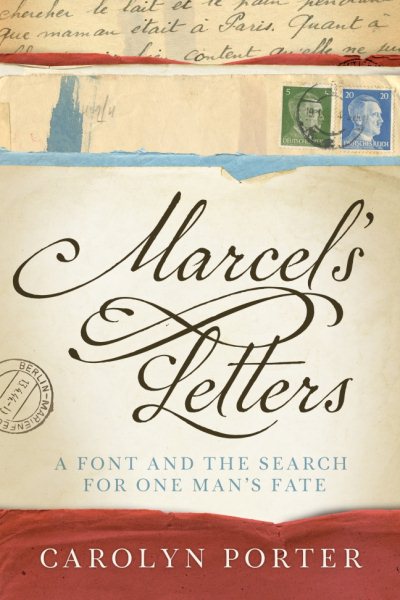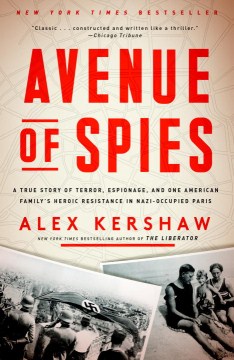By Annerin Long
Hundreds of volumes exist covering various aspects of World War II in France alone, and when Alliance Française de Jackson members were asked about favorite history books, the majority of them were on this subject. For Francophile Friday this week, Jeanne Cook and I are sharing some of our top recommendations on France in World War II.
 As a Francophile graphic designer who spends most of her reading time studying World War II, Marcel’s Letters: A Font and the Search for One Man’s Fate by Carolyn Porter was a must-read. Porter–also a graphic designer–bought some old letters at an antique store for inspiration, but as she worked on the new font, became more and more curious about the man–Marcel Heuzé–who had sent the letters from Germany to his home in France during the war years. Her book tells the story of not just developing another font, but also the search to learn more about Heuzé and his fate from a German workcamp.
As a Francophile graphic designer who spends most of her reading time studying World War II, Marcel’s Letters: A Font and the Search for One Man’s Fate by Carolyn Porter was a must-read. Porter–also a graphic designer–bought some old letters at an antique store for inspiration, but as she worked on the new font, became more and more curious about the man–Marcel Heuzé–who had sent the letters from Germany to his home in France during the war years. Her book tells the story of not just developing another font, but also the search to learn more about Heuzé and his fate from a German workcamp.
 Avenue of Spies: A True Story of Terror, Espionage, and One American Family’s Heroic Resistance in Nazi-Occupied Paris (Alex Kershaw) is about the life of American physician Sumner Jackson, his Swiss wife, and their son on Avenue Foch, one of the grand streets of Paris where many Nazi officials lived and worked during the occupation. Even with Gestapo headquarters also on this street, the Jacksons bravely became involved with the French resistance. Kershaw’s sources included the Jacksons’ son, Phillip, and his writing often had me on the edge of my seat, wondering how close the family was to being discovered.
Avenue of Spies: A True Story of Terror, Espionage, and One American Family’s Heroic Resistance in Nazi-Occupied Paris (Alex Kershaw) is about the life of American physician Sumner Jackson, his Swiss wife, and their son on Avenue Foch, one of the grand streets of Paris where many Nazi officials lived and worked during the occupation. Even with Gestapo headquarters also on this street, the Jacksons bravely became involved with the French resistance. Kershaw’s sources included the Jacksons’ son, Phillip, and his writing often had me on the edge of my seat, wondering how close the family was to being discovered.
Jeanne Cook, AFJ’s director of education, includes Is Paris Burning? (Larry Collins and Dominique Lapierre) and Wine and War: The French, the Nazis, and the Battle for France’s Greatest Treasure (Don and Petie Kladstrup) among her recommendations for books on France during World War II.
Is Paris Burning? reads like a spy novel and is filled with suspense that makes this non-fiction book one that can hardly be put down. It focuses on Nazi-occupied Paris and Hitler’s general in control of Paris, Choltitz, who is given the order to burn Paris as German troops flee as Allied forces approach. The New York Times called it “a great story. . . dramatic, exciting, pitiful and intensely human.”
For books specifically related to D-Day, Mrs. Cook recommends D-Day: D-Day through French Eyes: Normandy 1944, by Mary Louise Roberts, 2014. This book provides an insight from the French perspective. Highly readable and in English, Roberts narrates events in Normandy through her historian’s eye and intersperses notes, letters, and journal accounts of events with many of the sources from the Mémorial de Caen archives. Her book provides the needed puzzle piece to better understand D-Day events: it answers “What were the Normans experiencing?” Her chapters address parachutists, friendships, cathedrals, and devastation from bombings.
Finally, she suggests Neptune: The Allied Invasion of Europe and the D-Day Landings, Craig L. Symonds (2014). This book, called a “masterpiece,” explores the planning, including the landings and the supply system, which became a part of the Overlord invasion of D-Day. The plan was code-named Neptune.
Whatever your interest in World War II reading, be sure to check out Lemuria’s extensive history section (my favorite section in the store) for a wide selection of books an all aspects of the war.
Other recommendations:
- Village of Secrets: Defying the Nazis in Vichy France by Caroline Moorehead
- Paris after the Liberation: 1944-1949 by Antony Beevor & Artemis Cooper
- Les Parisiennes: How the Women of Paris Lived, Loved, and Died Under Nazi Occupation by Anne Sebba
The Alliance Française de Jackson is a non-profit organization that promotes French language and culture and welcomes all with an interest in the Francophone world.


Comments are closed.